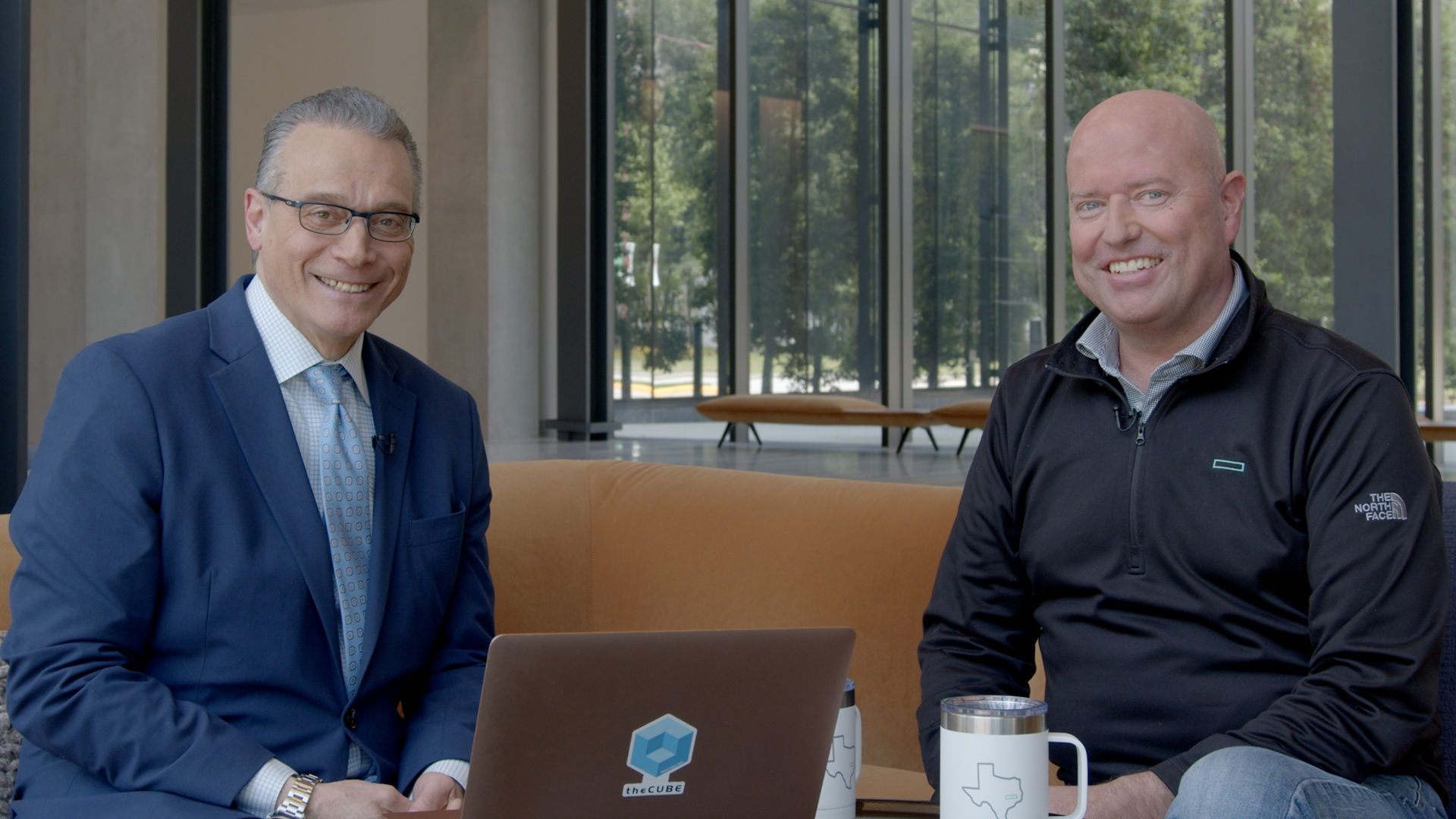 AI
AI
 AI
AI
 AI
AI
Artificial intelligence is buzzing at the intersection of technology and innovation. Companies are evolving their strategic cores to harness several AI use cases toward expansion, business insights, product development and service delivery.
One of the several big tech names driving this shift is Hewlett Packard Enterprise Co. The company is charting a hybrid-focused future helmed by cross-sectional AI enablement, strategic acquisitions and broader integrations across the board.
“If you piece apart that [AI] workload — tuning, training, inferencing and machine learning, and then you look at the workflow like building the data pipeline, feeding the data and the data scientist, designing and building and testing the model, it’s a hybrid workload,” said Jason Newton (pictured, right), vice president of global marketing at HPE. “That ties directly into our strategy around why we believe the world will be hybrid and a hybrid cloud platform is desirable.”
Ahead of theCUBE’s coverage of HPE Discover 2024, from June 18-20, Newton spoke with Dave Vellante (left), theCUBE Research chief analyst, during an exclusive interview from HPE’s headquarters in Houston. They discussed HPE driving its proposed hybrid future through AI-enabled solutions, revolutionizing how businesses approach technology. (* Disclosure below.)
Following the pandemic, HPE saw a palpable need for new wind in its sails. By taking an early step into the AI playing field and bolstering up with several enabling acquisitions, such as Juniper Networks, the company is moving ahead and laying the hybrid future’s networking underpinnings.
“[By] adding Juniper to our strengths with Aruba, the core of the company now is going to be a networking company, but it does play into AI,” Newton said. “Just like you need different resources for compute and storage optimized for the demands of AI, the networking is going to be the same. You’re also going to see an increase in complexity in all of this environment, and one of the strengths of combining our company with their company is what we can do with AI operations to power and manage that and deliver a whole new experience.”
Akin to hybrid cloud, HPE envisions a paradigm relying on constant intercommunication between disparate datasets, storage and compute to hone AI capabilities at scale. The importance of that seamless interplay is particularly crucial as the enterprise embraces edge computing, with inferencing and model deployment happening closer to the point of data generation, according to Newton.
“Some of that is happening in the public cloud, a lot of it is happening in private clouds — it’s happening on-prem,” he said. “It’s happening in some of these specialty AI providers that are providing a dedicated set and stack of resources to optimize for a specific model — [and] we’re seeing that as hybrid. But then when you develop the model, you deploy the model, you do the inferencing, that’s deployed out at the edge.”
HPE’s vision for AI’s future will prioritize platforms over products and rely on seamless cross-board integrations, starkly resembling the company’s strategy for hybrid cloud solutions. The AI platforms must offer flexibility and scalability, enabling customers to start small and grow their capabilities over time. Importantly, AI platforms will allow for continuous improvement and adaptation to evolving AI technologies, Newton pointed out.
“We think that customers shouldn’t the tech products for AI and instead, should start embracing a platform-based approach to tackle AI,” he said. “It’s the same approach that we recommended for tackling the hybrid cloud issues. We realized the only way to make that happen and to deliver a consistent experience across everything was to build a platform specifically for the demands of hybrid cloud. You’ll see a lot of innovations around the platform experience, especially tuned towards AI, that we’ll be announcing at Discover this year.”
HPE handles many broader industry use cases, from drug discovery in pharmaceuticals to factory management in manufacturing. But one common AI use case denominator for the company is enabling productivity. By driving tangible business goals, productivity serves as a compelling testing bed for the company’s clients to justify and expand their AI investment and understand how it fits into their operations, Newton explained.
“We’re in the high end of all of that, but when you talk to the everyday enterprise, what they’re looking for in almost every use case is about productivity,” he said. “I think that they’re using that as a safe space to learn. It gives them a tangible ROI [and] a business case so that they can then justify the investment to the board, and then it gives them the opportunity to learn so that they can grow on top of that.”
Here’s theCUBE’s complete video interview with Jason Newton in advance of HPE Discover 2024:
(* Disclosure: Hewlett Packard Enterprise Co. sponsored this segment of theCUBE. Neither HPE nor other sponsors have editorial control over content on theCUBE or SiliconANGLE.)
Support our mission to keep content open and free by engaging with theCUBE community. Join theCUBE’s Alumni Trust Network, where technology leaders connect, share intelligence and create opportunities.
Founded by tech visionaries John Furrier and Dave Vellante, SiliconANGLE Media has built a dynamic ecosystem of industry-leading digital media brands that reach 15+ million elite tech professionals. Our new proprietary theCUBE AI Video Cloud is breaking ground in audience interaction, leveraging theCUBEai.com neural network to help technology companies make data-driven decisions and stay at the forefront of industry conversations.